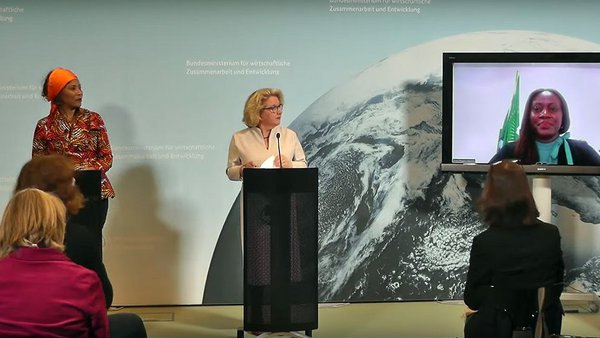 Read this article in French
Read this article in French- Share this article
- Subscribe to our newsletter
The BMZ’s new Africa Strategy – jobs for the biggest young generation of all times
Presenting the new African Strategy, German Federal Development Minister Svenja Schulze said that the way Africa developed and changes would leave its stamp on the 21st century and thus also determine the future of Germany and Europe”.
“About half of all the people in Africa are younger than 20,” the Minister noted. “The prospects that this young generation has will play a part in determining how they can harness their power for good ends. This is therefore about using the opportunities connected with this biggest ever young generation for sustainable development.” Schulze added that in order for that to happen, an additional 25 million jobs would be needed in Africa – each year. “The Development Ministry cannot create these jobs itself,” she noted. “But we can work with Africa to create good foundations and conditions.”
The core of the Africa Strategy is to create an enabling environment for new jobs that have a social and environmental impact, and at the same time empower women. Examples here are energy transition partnerships, sustainable infrastructure, establishing a new green hydrogen industry, processing food locally, more intra-African trade or better access to credit for women.
Digital technology is also an important transformation lever, especially for the young generation. This will make the BMZ’s Africa policy more social, environmental and feminist. These are the threads running through all six of the Strategy’s focus areas.
Sustainable economic development, employment and prosperity: The aim is to achieve a fair transition, in other words a social and environmental transformation of the economy that combines the conservation of vital natural resources with economic prosperity, social justice and the creation of decent jobs.
Overcoming poverty and hunger and building social protection: The aim is to transform agricultural and food systems in order to strengthen food security over the long term. Expanding social protection systems will also help reduce poverty and inequality, which makes it a basic prerequisite for decent work and fair development.
Health and pandemic prevention: The aim is to establish robust basic health systems and support the establishment of medical production capacities (particularly for vaccine manufacturing).
Feminist development policy and gender equality: The aim is to address the root causes of inequality and discrimination against women and girls and to improve their rights, representation and access to resources. Putting a focus on women is an important lever for good development and new jobs.
Rule of law, democracy, human rights and good governance: The aim is to strengthen democratic institutions, effective public authorities and a free press as the basis for resilient societies and political participation.
Peace and security: The aim is to target the root causes of conflict and prevent conflict through an integrated approach combining humanitarian aid, development cooperation and peacebuilding. Support is provided to refugees and displaced persons and, equally, to host communities.
The African continent has 1.4 billion inhabitants today – by the middle of this century it could be two-and-a-half billion. The only way to tackle and overcome the big global challenges, from fighting climate change and biodiversity loss to new pandemics, is by working together.
Minister Schulze said: “We would be well advised to cultivate good neighbourly relations with Africa. In the new multipolar world order, Germany and Europe must act in good time in order to build their abilities to form solid alliances, networks and partnerships with other continents, too.”
The Strategy grew out of a six-month consultation process with European and African representatives from the spheres of politics, the private sector, civil society, academia and youth.
(BMZ/wi)
More information:
You can find the Africa Strategy here





Add a comment
Be the First to Comment